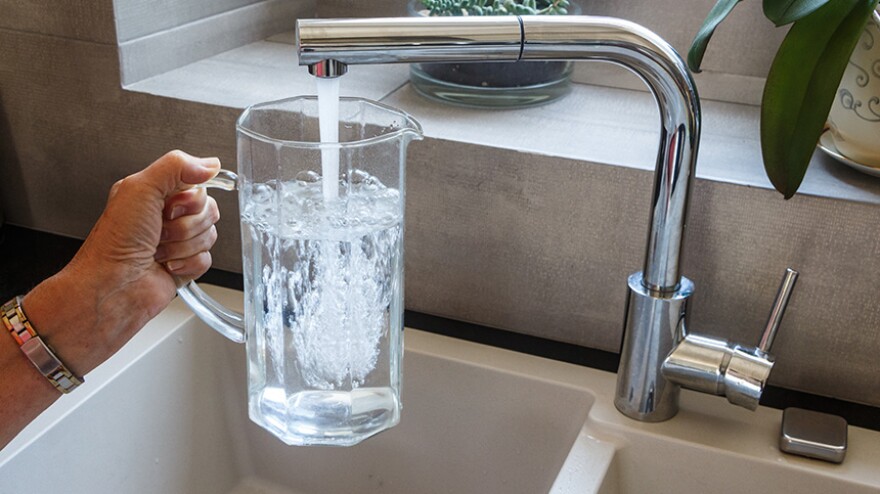- EnvironmentAmerica and the Public Interest Research Group have given Pennsylvania a failing grade when it comes to regulation of lead in water in schools
- Since 2018, six local schools have reported unacceptable levels of lead: Allentown, Easton Area, Parkland Area and Southern Lehigh school districts, and Bethlehem Vocational-Technical School, Carbon Lehigh Intermediate Unit 21
- An expert says their remediation plans were less than desirable
ALLENTOWN, Pa. — Since 2018, six local school districts have reported unacceptable levels of lead in their water, and one expert says some of the remediation methods they used are less than perfect.
Allentown, Easton Area, Parkland and Southern Lehigh school districts, and Bethlehem Vocational-Technical School and Carbon Lehigh Intermediate Unit 21 have received at least one lead violation in their water since 2018, according to the state Education Department.
A recent report from EnvironmentAmerica and the Public Interest Research Group gave Pennsylvania a failing grade in regard to its regulation and treatment of lead in schools’ water.
“Pennsylvania law provides that schools must test at least some taps for lead annually, but a loophole allows school districts to avoid this requirement simply by discussing the issue at a public meeting," the report from EnvironmentAmerica and the Public Interest Research Group states.
As now implemented, state guidance requires action only above 15 parts of lead per billion in water.
"There's a reason that we gave Pennsylvania a failing grade. Which is that, you know, that's far, far too high…the American Academy of Pediatrics is very clear that no level of lead is safe.”Stephanie Wein, a clean water advocate for PennEnvironment
"There's a reason that we gave Pennsylvania a failing grade," said Stephanie Wein, a clean water advocate for PennEnvironment, a group affiliated with EnvironmentAmerica.
"Which is that, you know, that's far, far too high…the American Academy of Pediatrics is very clear that no level of lead is safe.”
The legislation also requires that any test results above the action level determined by the U.S. Environmental Protection Agency are reported to the Pennsylvania Department of Education and posted publicly on the agency's website.
LehighValleyNews.com searched through the statewide data and found six local districts that have reported lead levels above 15 parts per billion at least once since 2018.
Furthermore, the regulations have been in place only since the beginning of the 2018-19 school year. Because they only require a sample of taps to be tested each year, some taps may remain untested entirely at elevated levels, Wein said.
An imperfect science
Testing also is an imperfect science, Wein said.
“Even if you're testing regularly and transparently, testing, at the end of the day, is only a snapshot," she said. "And so as scary as these numbers are, we also know that they're not the full extent of the picture.
“We're seeing the tip of this big, toxic iceberg; wherever there is lead infrastructure, we're going to have lead contamination.”Stephanie Wein, a clean water advocate for PennEnvironment
“Because there could be taps that just weren't shedding a lot of lead that day, but have the capacity to and maybe next week, we're shedding a lot of lead, based on the temperature, the pH of the water, lead solubility has a lot of factors.
“We're seeing the tip of this big, toxic iceberg; wherever there is lead infrastructure, we're going to have lead contamination.”
Wein said there are three main flaws in Pennsylvania’s regulations surrounding lead in school water:
- “Our requirement is not really a requirement, because it's easy to get out of it.”
- “As it's enforced, schools are generally only taking action above 15 parts per billion.”
- “The clarity on, like, what exactly is happening in these school districts?”
The third point shows a problem in that even the reporting mechanism is unclear and often incomplete, Wein said.
A LehighValleyNews.com review of what is posted by the state Education Department also shows frequent typographical errors and empty fields of information.
There's also little organization in the sheet showing all of the reported lead infractions since 2018.
Local Cases
Since 2018, six local school districts have reported at least one elevated lead level, available in the table below.
Allentown School District had 19 positive lead tests in 2019-20, according to a posting by the state Education Department.
The 2019 remediation plan listed is “flushed and/or replaced” for each of the eight faucets that tested above the EPA action level.
Wein pointed to a similar remediation plan in Abington, Montgomery County, that said, “flush and test again,” and said such plans are pointless, and reporting unclear.
“Nothing's been changed, nothing's been fixed," she said. "But when we flush it, the levels are lower. But nothing's changed.”
Wein also pointed out that the remediated levels in some cases still were quite high, even if below the EPA action level.
“And as you can see, there's still lead concentrations," she said. "You know, the Muhlenberg one at 13 [ppb]. Still, after whatever they did, it's not clear what was done.
"So, you know, I look at this, and I don't actually have a clear picture of what actions were taken. And if I were a parent, I wouldn't feel like this was a safe and satisfactory response.”
Tom Smith, executive director of facilities services for the Allentown School District, said in a statement, “As you can see from the PDE report, Allentown School District has diligently addressed any instances where lead levels in our school facilities exceeded 15 parts per billion (ppb).
"Each time such an occurrence was documented, we promptly initiated a remediation plan. For the schools that underwent testing in 2019, the actions taken included the replacement of faucets and a thorough system flushing.
"Subsequent tests conducted after these measures were implemented returned results well below the acceptable lead levels, demonstrating the effectiveness of our remediation efforts," Smith said.
Smith also said he would like to "emphasize that the Allentown School District is committed to the annual testing of our water systems for lead contamination.
"We have maintained an annual testing regimen to ensure the ongoing safety of our students and staff," he said in the statement.
“Since 2020, we have not encountered any findings that necessitated reporting to the Pennsylvania Department of Education (PDE). This emphasizes our dedication to maintaining lead levels within safe limits and reflects the positive impact of our remediation actions.
"Allentown School District remains steadfast in our commitment to providing a safe and healthy environment for all members of the Allentown School District community.
"We will continue to prioritize annual lead testing and immediate remediation when necessary to ensure that our facilities consistently meet and exceed the highest safety standards.”
Easton, others — and what to do
Easton Area School District had two water sources that tested over the acceptable threshold for lead in February 2021, though according to Ken Case, EASD Director of operations, it was a district building that did not house students.
The remediation plan the district chose was a temporary shutdown and resample, which Case said was recommended by the district consultant who assists with testing and remediation.
“I do not know of any buildings, or any piping, in the district that is lead based," Case said. "And we test yearly to follow the requirements of the EPA.”
Parkland Area and Southern Lehigh school districts, Bethlehem Vocational Technical School and Carbon Lehigh Intermediate Unit 21 did not respond to requests for comment for this report.
Dr. Chase Jones, a medical toxicology fellow with Lehigh Valley Health Network, said that anyone concerned about being exposed to lead in drinking water — or their children being exposed — should consult a doctor.
“One thing I think that is very, very important is speaking with their pediatricians to get initial guidance."Dr. Chase Jones, a medical toxicology fellow with Lehigh Valley Health Network
“One thing I think that is very, very important is speaking with their pediatricians to get initial guidance," Jones said.
"Remembering that the screening tests that we use, we usually call capillary test or finger stick or heel stick to screen. And those tests can be falsely high sometimes.
“So the definitive level that we get has to be obtained by a whole blood, like an actual venous blood draw, to get a level to determine whether or not there is action to be had."
In addition, Chase suggested "following the CDC guidelines to see what steps they can take for their homes, remediation-wise.
"And doing the things that really we can't do in the hospital setting to help reduce risks of exposure to lead.”


